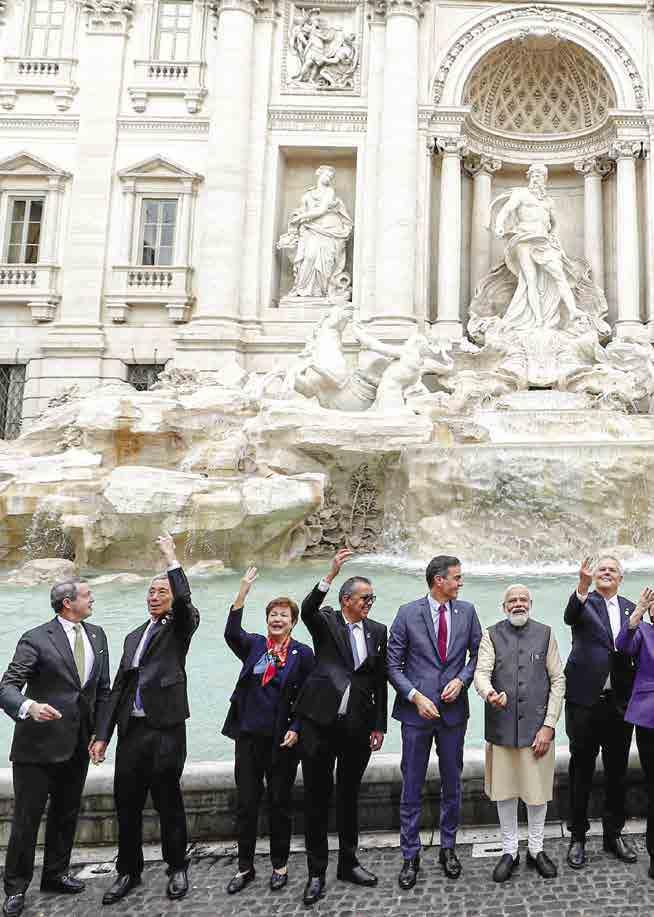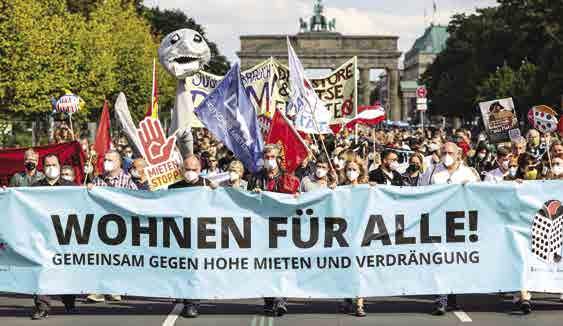
9 minute read
Hope in Politics
Hope in Politics
Creating a sustainable future starts with adopting a number of practical decisions and measures in the present.
Advertisement
BY VITTORIO EMANUELE PARSI — POLITICAL SCIENTIST
Our primary responsibility is always to keep that relationship in the back of our minds. I emphasise this because, if it was so easy for us to remember, insurance companies would not exist, our entire sector would not exist. By insuring ourselves, we are taking a step to protect ourselves at a future date, one that is further away yet better protected. Here, insurance and politics find common ground. Politics too offers guarantees in the face of uncertainty and instability: the more immediate and evident ones in the present and the ones we may encounter or that may arise in the future. Contrary to a popular belief that is as widespread as it is superficial and inaccurate, politics is not limited to forecasting situations and attempting to protect members of the community. Politics envisions, presents and describes a version of the future from among the many on offer, and offers a path to bringing about the envisioned future. It seeks support in the present from those who it promises to guide towards that future and that place that do not yet exist, but that will come into being as a result of the decisions that coming to power will enable to be taken. The struggle for power, competition between leaders in search of followers; this is the bread and butter of politics, and it is as necessary as the ability to provide a view of the envisioned future. The net result of the egocentrism and narcissism and the greater or smaller ethical and intellectual stature of its leading figures, the end goal of the pursuit of power, is to be in the position to influence or control the decision-making process that determines the implementation of political priorities. The ability to be in the place to take the decisions is what brings the future that we envisioned and that we desire closer, more likely and easier to achieve.
Envisioning is crucial because it is this that compels us to act responsibly and links the present and the future. It enables us to identify a destination, a place and time, a point on the horizon to be met and to be reached: forecasting a future implies that it is outside of our control and that we have no ability to influence it. We forecast weather conditions, we do not envision them. Envisioning means recognising that there is something we can do to bring us closer to the coveted goal or to distance ourselves from possible disaster. Today, that word, ‘disaster’, does not seem in the least bit disproportionate. Emerging from the disastrous outbreak of the COVID-19 pandemic, we are now on the verge of seemingly sleepwalking rapidly towards the point of no return in another, far more serious disaster in the form of climate change. Indeed, according to the latest report from the UN Intergovernmental Panel on Climate Change, we have already crossed that threshold. If we take a second to reflect, the same vast European post-COVID recovery programme – NextGenerationEU – as well as all the national programmes designed to implement it (such as the Italian National Recovery and Resilience Plan), all address these two areas, the pandemic and the environment, to chart a course to recovery that flies the flag of renewal: it has even raised hopes for a new Renaissance, something that goes far beyond a mere return to the previous status quo.

Protesters carry a banner reading "Housing for all" during a demonstration against rising rental costs for flats in Berlin, Germany, September 11, 2021.
REUTERS / CHRISTIAN MANG
This is an unrivalled opportunity to bring about a structural transformation of our economic system and of our society, on the path to making them both sustainable. However, for all of this to happen, for these objectives to be reached, sustainability must not end up becoming a catch-all solution, as it is often introduced and intended. Even sustainability can and should be recognised in all its vast complexity, unable to be all things to all people. This is where politics should come in: articulating the various proposed futures, each different from the other, in the clearest manner possible, allowing us – the voters – to make an informed decision based on our legitimate interests and our principles and values. A transparent contest between political leaders is the best – and I would argue only – way to hold us back from the dangerous path too often trodden of so-called “unavoidable decisions” by charismatic saviour-type leaders, who ultimately always protect and uphold the interests and values of those with influence. It is only by articulating different visions of the future, through political competition – the political arena – that we can avoid a politics empty of substance and restore responsibility and participation. If we do not wish to definitively bury the concept of political representation, and with it that of democracy – which in its modern incarnation can only ever be representative and therefore indirect – the simple summaries can only come after. For centuries, the political struggle has been our only available recourse to educate, refine, shape and formalise the social conflict, which cannot exist in any open society worthy of the name. These debates may seem abstract or removed from our daily lives, but a few simple case-studies are enough to disprove this notion. The decision whether to support or oppose remote work – for example – has an undoubted impact on the environment, in terms of carbon emissions and so on. Its impact on productivity, on the other hand, is more challenging to assess, because it depends on the quality of the physical capital and the extent of investments.
In an undercapitalised economic situation, where often profits are not reinvested into improving processes, the productivity of remote work may be lower than elsewhere. There are also more indirect or subtle consequences of remote work on the social and economic situation. The possibility of working from home becomes less appealing if one’s home does not have a dedicated workspace, or if there are children who need attention and academic support. This, as we know, has already had an impact on the real estate industry, with more people seeking housing that is more spacious or better divided. But what are the potential consequences of coming in to a physical office and sharing the working conditions on workers’ solidarity? And how far would companies go to reevaluate their proposed salaries for staff who could effectively save an hour or two a day on travelling to and from the office, with all the associated costs? In a country like Italy, which is already a regular fixture on the lower rungs of the ladder when it comes to salaries and with widespread informal, atypical or poorly paid employment, the risk that the recovery will be hamstrung by a reduction in disposable income is far from incidental. Or another question: What would be the impact of remote work on the urban environment of highly service-oriented cities? It could result in trends of hypergentrification and/or hyper’slummification’. We could see a collapse in revenue from small urban properties where, for decades, the middle class has been driven to invest its savings (in addition to government bonds), with the hope of a subsequent recovery in returns when the large real estate companies took over the property. A similar effect could be further intensified as a result of the (necessary) land registry income reforms, ultimately further entrenching inequality at the same time as the emphasis is on pursuing increased distribution of wealth and increased equality. To ward off the threat of restoring the status quo and to usher in a period of economic, political and cultural renaissance, it is not enough to direct funds towards a “green and digitised” economy. Rather we must evaluate the possibilities and discard those that do not meet our vision. If this truly is to be our direction, then it is clear that the critical factor in our success will be the human capital, improving and empowering it. Recognising this, however, means more than repeating the same tired formula – it requires a radical shift in mentality. If the capital on which we are staking our future, recovery, transformation and development is the human kind, then it inherently follows that all the expenses channelled towards its incremental qualitative and quantitative improvement become investments: from healthcare and education to everything that enriches our lives and makes them more productive, fulfilling, and happy.
At the same time, all that spending on infrastructure that distances us from the green economy does not necessarily represent an investment: for example, the construction of a bridge across the Strait of Messina or new motorways, or investments in hydrocarbon or nuclear power. Sustainability cannot become a catchy slogan for all seasons: not only because it must be recognised in all its various meanings – environmental, economic, social, ... – but because there are still different profiles of sustainability, different proposals for a sustainable future among which we are called to choose. A hypothetical digital economy in which cryptocurrencies play a central role – with the horrific toll on the environment involved in “mining” them – would be a lot less green than one in which finance plays a role in supporting the transformation, and in which promoting the concept of happiness (as an enhanced form of wellbeing) creates a recognisable and tangible effect on the value chain. I believe this is what is truly at stake with NextGenerationEU and Italy’s NRRP, and the sooner we recognise it, the better it will be for all of us.

Vittorio Emanuele Parsi — Professor at the Università Cattolica del Sacro Cuore in Milan, where he teaches international relations in the Faculty of Political Sciences and in the Faculty of Foreign Languages and Literature. He is the director of ASERI, the School of Economics and International Relations, at the Università Cattolica del Sacro Cuore. He has been managing a specialisation course in economics and international politics since 2005. Previously a columnist for La Stampa and Avvenire newspapers, since 2013 he has been a columnist for Il Sole 24 Ore. He is the editor-in-chief of the magazine Idem. He is a member of the advisory board of LSE IDEAS (Center for Diplomacy and Strategy at the London School of Economics), a member of the Società per lo studio della diffusione della democrazia [Society for the Study of the Spread of Democracy] and the Società italiana di scienza politica [Italian Political Science Society] and is also a member of the Italia USA Foundation. He plays as a centre for the Rugby Monza OLD team.










